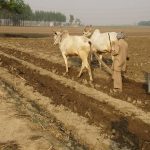DISAPPEARING WITHOUT A TRACE? OR CAN IT SURVIVE IN SOMEWAY!
That is the question?
ਕੋਈ ਤੇ ਹੌਂਸਲਾ ਦੇਵੋ ਮੇਰੇ ਉਸ ਦੇਸ ਬਾਬੁਲ ਨੂੰ,
ਉਹ ਪਰਬਤ ਹੌਂਸਲੇ ਵਾਲੇ ਖੁਰਦਿਆਂ ਖੁਰ ਰਹੇ ਵੇਖੋ
ਪਾਲ -ਪੋਸ ਕੇ ਧੀਆਂ ਤੇ ਕਰਦੇ ਸੀ ਵਿਦਾ ਆਏ,
ਪਾਲ-ਪੋਸ ਕੇ ਪੁੱਤਰ ਤਾਂ ਵਤਨੋਂ ਤੁਰ ਗਏ ਵੇਖੋ . . .ਦੀਵਾ ਬਲੇ ਸਮੁੰਦਰੋਂ ਪਾਰ ਵਿੱਚੋ
 Inspired by this picture shared from Inderjit Chogawan’s post, I felt compelled to write this blog again although I have written about the subject and posted on my website before.
Inspired by this picture shared from Inderjit Chogawan’s post, I felt compelled to write this blog again although I have written about the subject and posted on my website before.
Change that comes through progress also means the destruction of what was in its place before. Evolution through which this universe has evolved also meant change. Man cannot stop the wheel turning but he can learn to regulate it and steer it safely. In my own generation, I watched this wheel turning at a dizzying speed apparently going the wrong way. Take the story of water and the ‘Persian wheel’ for instance. 
I watched the Persian wheel we call “Khooh”in Punjabi with its earthen pitchers and wooden mechanism driven by good old bullocks or a camel.
This was replaced by metal buckets, wrought iron mechanisms improved by the addition of ball bearings in its own time. Since then things moved so fast and so out of control that the hand-dug wells were replaced by shallow tube wells, which went deeper and deeper before we know it.

Now all are replaced by submersibles sucking water up to and beyond 500 feet beneath the surface drawing from more and more brackish layers as it gets deeper.
As a consequence there is not enough sweet water left to go round fulfilling the irrigation needs of Punjab; not to mention help meeting the needs of her brotherly states such as Haryana or Rajasthan. 
Elsewhere I also watched the man landing on the moon and beyond perhaps in search of more water!
In Punjab, the land of five rivers – cradle of erstwhile Indus Valley civilization, something more important is at stake!
It was here that the land was first brought under the plough before anywhere else in the world some 5000 years ago. In order for help in heavy lifting, it is here that the little man called farmer or jatt in Punjabi is said to have shown the world the way. And that was to respect, care and work with domesticated animals as pals. Working together they treaded paths for feeding mankind never treaded before; opening the door to the civilization as we know it today.
 More to the point, over the years and for centuries as Punjab remained the food bowl; it became the backbone of undivided India and so remained, since. Come rain or shine sacrificing and toiling for generations; the little man however, remained little!
More to the point, over the years and for centuries as Punjab remained the food bowl; it became the backbone of undivided India and so remained, since. Come rain or shine sacrificing and toiling for generations; the little man however, remained little!
4-5 decades ago his plough began to disappear; so did begin the disappearance of the little man, his pals and the associated culture. What an irony that the specie and its associated culture which revolutionized the world in terms of food production is at the verge of getting extinct in its very homeland; where it was born, grew up and evolved. Some say the backbone of India especially Punjab is now cracked if not entirely broken.
Go figure out the nature of the so called ‘Vikas’ in modern times that is leading to this!
Leave a Reply